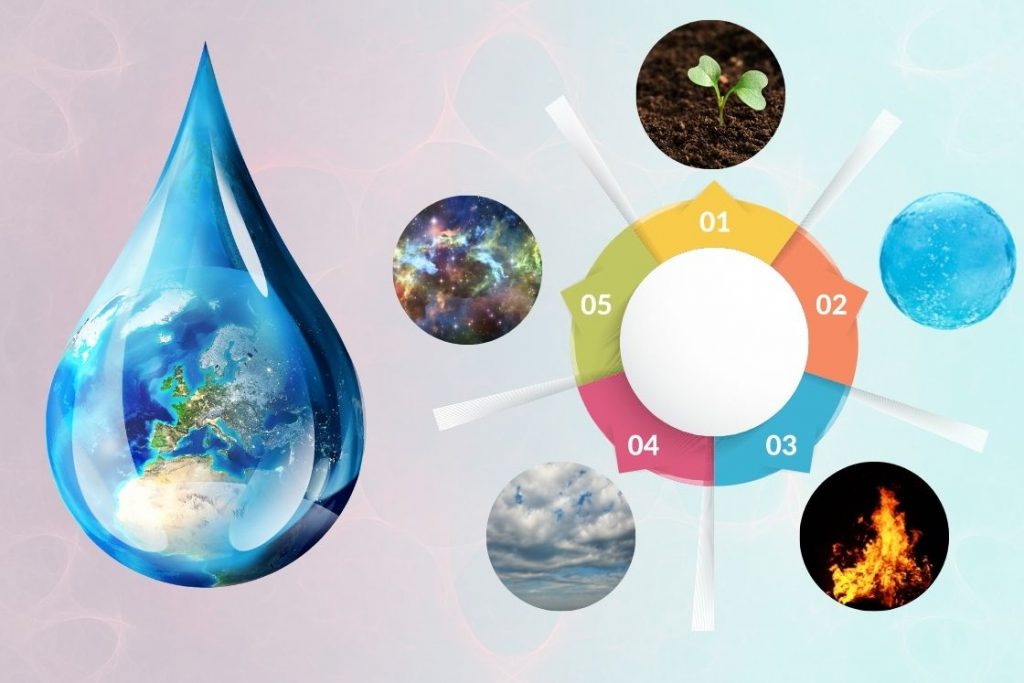- Symbolism
- Ayurveda
- TCM
- Spiritual context
- Functions
- Excess of water element
- Deficiency of water element
- Practices to Balance

Our body is made up of 5 elements – ether, fire, air, water, and earth. They are also called Pancha tatva or Pancha Mahabhutas in Ayurveda. Out of these 5 elements, 4 are physical components with which the entire world is also made of. While ether is more of a spiritual element, which literally translates to “the fifth element” in Latin.
Looking at the chronological order, water is the fourth element and is said to be derived from the ether, air, and fire. Ether, space or spirit as it is also called, gives the space to exist. The air gives rise to the heat of fire with its friction and when this fire cools down, it takes a denser form, which is the water element.
The water element is called apas in Sanskrit and is one of the most important elements for your physical and mental well-being. It has special meaning and relevance in many cultures.
In this article, let us have a deeper look at the water element and how it helps in maintaining harmony between the mind-body.
The symbolism of Water Element
Water is available in the most abundant form on earth and even in our bodies. Geographically, 71% of the earth’s surface is water, which includes all forms of oceans, lakes, streams, rivers, etc. Even our body is made up of 60-70% water.
So it is safe to say, that water plays an important role in the functioning of not only our planet but also of our body.
Talking about the qualities of the water element, it is cool, stable, heavy, moist, smooth, gross, flowing, dull, cloudy, and soft. It is also a well-known natural antidote to counter most elements that try to overpower your emotions and behavior.
Ayurveda
According to Ayurveda, the Kapha Dosha has the water element as its dominant element. This dosha is made up of water and earth elements, the water element acts as a foundation to the heavy and stable qualities of the earth element.
The water element is present in our bodies in five places; chest, stomach, head, mouth & tongue and joints. These five places are referred as five Kapha types;
- Avalambaka Kapha (chest) – It is responsible for protecting the heart and lungs and providing strength to the back and chest muscles.
- Kledaka Kapha (stomach) – It is responsible for breaking down food into digestible portions and protecting the lining of the stomach from acids.
- Tarpaka Kapha (head) – Its main function is to protect the sensory organs, lubrication to the nerves, and provide calmness, happiness, and stability.
- Bodhaka Kapha (mouth and tongue) – It helps in perceiving taste and producing saliva to lubricate and moisten the food to make it digestible.
- Sleshaka Kapha (joints) – The main purpose is to keep the joints moist. It protects them from wear and tear by providing stability and strength.
The main season for dominance of the water element is the spring season when everything seems to come to life.
On your hands, the pinky finger represents the water element. You can practice specific hand mudras to increase and decrease the water element in your body. For example, Varun mudra stimulates water element in the body.
Traditional Chinese Medicine (TCM)
TCM links water element to wisdom, stamina, endurance, modesty, and sensibility. According to TCM theory, the season for water element is winter as opposed to spring in Ayurveda. The emotion most commonly linked to water is ‘Fear’. It can be fear of an insect such as a spider, snake, or fear of heights, fear of not being good enough, etc., or any fear that manifests as survival anxiety or fear of extinction.
The kidney and urinary bladder are the organs where the water element resides. The kidney is said to be the powerhouse of energy that helps in digestion and reproduction. Thus an imbalance in water element can lead to kidney problems which eventually results in a reduction in stamina, strength, fertility, and other digestive problems.
Spiritual, Historical and Cultural symbolism
In different cultural references, water is also linked with feminine energy and the moon. It symbolizes emotions, healing, friendship & love, purity, mystery, dreaming, flowing, fluidity, stability, strength, change, fertility, devotion, and receiving. This is why a water dominant personality is said to be calm, pure, full of compassion and love, loyal, etc.
In the spiritual context, death and rebirth are symbolized by the water element. The rain is considered life-giving whereas floods and droughts often cause death and destruction.
Historically speaking, most civilizations were established near water sources, the Nile is called the lifeline of Egypt, and the Greeks worshipped the water god Poseidon.
In Hindu culture, the river Ganga is considered spiritual in India and people take a dip in it to purify themselves, Christians perform a baptism in holy water, ancient Jewish traditions ask its people to spiritually cleanse in a bath on special occasions, and Muslims perform ablution or wudu with water before their prayer.
Many cultures have used water as a source of cleansing or purification along with its importance of being a source of life.
Thus it doesn’t come as a surprise that water has been given immense importance in maintaining our well-being. From following a liquid diet to Jal Neti (Nasal cleansing technique in yoga), you will notice that in some way or the other, water is being used to bring about a balance in our body.
When water is deficient, your body immediately starts feeling and showing effects. Most ailments can be partially resolved with proper water intake. Water makes your body function in a fluid manner and also helps in activating the hormones needed to keep you healthy.
Functions of water element in the body

Water performs a plethora of important functions from detoxification, maintaining our body temperature to carrying oxygen to cells and the nervous system. You can get water element in your system through drinking water and beverages and food items.
Let us have a look into the functions of the water element in detail.
Regulates Body Temperature
Water element makes up the majority of our body composition hence it also works as a temperature controller. The sweat you produce when you work out, have been doing any intense physical activity, or suffering from fever helps keep a check on the body temperature from rising.
Producing sweat also means you are losing water from your body. This loss of water can also be caused due to vomiting or diarrhea. You also need to replenish this loss of water by drinking plenty of water or juices to keep you energized and prevent dehydration.
Produces Saliva
Saliva is one of the main components of digestion. The water element in our body helps in producing saliva to break down the food into minute digestible pieces. Moreover, it is also important in keeping your mouth healthy as it contains various enzymes and electrolytes in small amounts.
This is why it is important to take note of any dryness in the mouth or whiteness in the tongue. It can be an indication that your body needs more water content.
Aids in Digestion
While saliva is the first step of breaking down the food pieces, the major work is done in the stomach and intestines. Water helps in absorbing the nutrients you get from your food and the water you drink. It is passed on to the bloodstream. It also works towards digesting the soluble fiber.
Lubricates the joints, tissues, and spinal cord
One of the kaphs dosha, the Sleshaka Kapha, is said to be present in the joints. These joints are supported by various tissues, which are kept moist through the presence of water. The bones and joints are kept lubricated which is beneficial in keeping away ailments such as arthritis. Your spinal cord can also work optimally if you keep yourself hydrated.
Detoxifies your body
The best way to detoxify your body is through the water. You must have seen various concoctions been suggested to be imbibed in your daily routine to aid in detoxification. The body naturally keeps removing toxins from the body through sweat, urination, and defecation.
Water helps the kidney to filter toxins from the blood and the digestive tract removes unwanted substances from the food. Keeping yourself properly hydrated will also prevent constipation and kidney and bladder stones.
Helps in the optimal function of your brain
Did you know that the brain contains 75% of the water present in our body? This is why when your body loses water, it also loses electrolytes, which are one of the key elements for your brain to function properly.
This loss can cause fogginess in the brain which also manifests as weakness, tiredness, and confusion. Replenishing yourself will also help in reducing anxiety, mood swings, stress, and enhance memory, focus, and alertness.
Healthy cardiovascular system
Most of the water is present in the blood, which is supplied to the entire body 24/7, through the heart. The water is absorbed into the bloodstream through the food and drinks we consume. If there is not enough water in the body, it can lead to an imbalance in the minerals. The blood will also become concentrated which can cause many muscles or heart-related problems.
Adequate water consumption also improves oxygen circulation throughout your body.
Boosts energy and physical performance
When you drink water, you are also enhancing your metabolism, which in turn gives you energy. This energy will aid you in performing your exercises, sport, training, or other physical activities. It enhances your stamina, endurance, and strength.
Helps reduce symptoms of illness
Lack of appropriate level of water content in the body can be a cause of many ailments/illnesses such as –
- Constipation
- Low blood pressure
- Kidney failure
- Hyperthermia
- Constipation
- Dehydration
- Urinary tract infection
- Hypertension
- Stones in the kidney and bladder
- Seizures
The importance of water can be justified by the fact that adequate water consumption can alone help in reducing the onset of such illness to some extent.
What happens when water element is in excess?
We understand how important water is for the proper functioning of the mind and body. However, excess of anything can be detrimental to our system. When water is in excess, it is also called water retention and can be the major cause of bloating, puffiness, and swelling.
Water retention is a common issue that can be caused due to genetics, an improper diet with a high amount of sodium, menstrual cycle, medication, sedentary lifestyle, pregnancy, or any other medical condition.
Here are some other symptoms of excess water element in the body:
- Bloating
- Swollen legs, feet, and ankles
- Puffiness of the abdomen, face, and hips
- Stiff joints
- Weight fluctuations
- Excessively emotional or depressed
- Slow digestion and lack of appetite
- Nausea
- Excess salivation
- Feeling of dullness and heaviness
- Sluggishness, laziness, lethargy
- Excessive sleep
- Excess urination
- Varicose veins
- Cough and congestion
- Nasal mucus, running nose
What happens when water element is deficient?
There is a higher chance of a decrease in the water element in the body as we do not give importance to water consumption. Deficiency in the water element can also be caused due to excessive sweating, diarrhea, vomiting, excessive urination, or any medical condition.
The signs of water element deficiency are shown by the body in the following ways:
- Decreased urination with a dark yellow color and a strong odor
- Palpitations
- Dry and dull skin
- Dry mouth and tongue due to less saliva
- Low blood pressure
- Fatigue, low energy, and brain fog
- Weight gain
- Abdominal pain and cramps
- Dizziness, headache
- Irritability
- Weakness in muscles
- Crackling sounds of joints due to looseness
- Empty feeling in the heart and chest
- Constipation
- Frequent illness
Practices to balance the water element

The good news is that if the symptoms are mild, you can easily take care of them by making some lifestyle changes such as improving your diet, exercising, and taking care of water consumption.
Here are some easy and effective practices you can apply to connect with the water element.
For excess water element
- Reducing consumption of salty, processed food that may cause bloating and carbs.
- Avoid consumption of alcohol, excess caffeine, or tea.
- Eat potassium and magnesium-rich foods such as dark green leafy vegetables, beans, bananas, avocados, tomatoes, parsley, garlic, fennel, dairy products, dark chocolate, nuts, and whole grains.
- Consider a detoxification diet to clear any blockages from the digestive organs and kidneys.
- Control your stress levels to keep stress hormones in balance.
- Get adequate sleep to activate your parasympathetic nervous system.
- Exercise regularly to decrease water weight through sweat. Practice intense yoga exercises to flush out excess water element. Sun Salutation, Chair pose (Utkatasana), Boat Pose (Navasana) and Wind Releiving Pose (Pawanmuktasana) are some recommended yoga asanas.
- Maintain good hydration as the kidney can retain more water to prevent the occurrence of a dehydrated state.
- Maintain constant body movement to avoid a sedentary lifestyle.
- If you are taking any medication check with your doctor for water retention possibilities.
- Practice meditation with Jal Shamak Mudra for 15 minutes 3 times a day for 10 days to suppress the water element. You can perform it by placing the tip of the pinky finger at the base of the thumb and putting gentle pressure on the pinky finger with the thumb.
- Ujjayi Breath generates heat within the body which can also help in reducing the excess water element.
For deficient water element
- Drink more water or beverages such as juice or milk with every meal. Minimum 8-10 cups are essential to keep the water content in balance.
- Notice the color of your urine. The darker the color, the less water in your body. Adjust your water intake accordingly.
- If the insides of your mouth start to get dry, it is time to up the water consumption.
- Avoid caffeine and alcohol.
- Take electrolytes to compensate for the loss of essential minerals from your body.
- Eat water-based fruits and vegetables such as cucumbers, tomatoes, celery, watermelons and musk melon, lettuce, peaches, apples, citrus fruits, zucchini, etc.
- Consume naturally sweet food such as dates, fresh fruits, milk, cashews, and rice as they have a soothing and relaxing effect on the mind.
- To add variety, you can consume broths, soups, flavored water, or juices.
- If you are prone to drinking less water, keep a water journal to track your water intake.
- Eat warm, fermented, and salty food which will aid in water retention. Food items such as seaweed, brown rice, walnuts, parsley, kidney beans, mushrooms, leafy greens will also benefit.
- Practice light exercises such as walking or yoga to prevent excess sweating.
- Always carry a water bottle with you when you are exercising, traveling to a hot place, working, or are prone to dehydration. Increase your intake during periods of illness.
- Practice meditation with Jal Vardhak Mudra for 15 minutes 3 times a day for 10 days to increase the water element. You can perform it by joining the tip of the pinky finger and the thumb together.
- Perform Moon Salutation to tap in the energy of the moon and Yoga Nidra. Try moon bathing.
Imbalances can be a cause of mood swings and various other negative behavior. You can try alternative methods such as guided meditation with the sound of waves or oceans, looking at natural scenes that involve water, going swimming, taking a walk near a stream, walking in the rain, taking a warm bath, or being near water in any form.
Smelling petrichor, the scent that you smell when rain falls on dry earth, is said to be one of the most pleasant smells.
The cooling quality of water will have a calming effect on you.
Conclusion
If you know most forms of water, you can easily relate to the changes happening inside your body and accordingly deal with it. In most cases, drinking water proves to be the best solution as it contains many important nutrients. The cooling effect it has on the body can cheer you up if you are feeling low or bring your temper down.
Keep nourishing this element to experience contentment, better relationships, and harmony between your mind and body.




